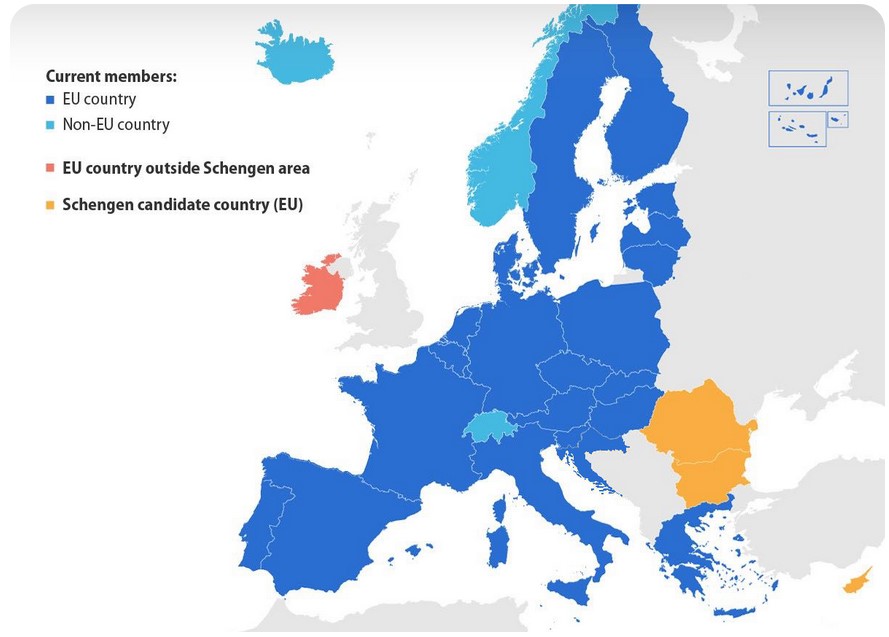Romania and Bulgaria to join Schengen soon
 Romania and Bulgaria (collage by RBC-Ukraine)
Romania and Bulgaria (collage by RBC-Ukraine)
Bulgaria and Romania are joining the Schengen Area after long expectations. Starting in March 2024, air and sea border controls between the two countries and the Schengen area will be canceled, but control on the land border will remain.
Sources used: Travel Tomorrow, Schengenvisainfo, Financial Times, official statements of the European Commission, President of the European Council Charles Michel.
Bulgaria and Romania in the Schengen area: what will change
Starting from March 1, 2024, there will be no more checks of individuals at the internal air and sea borders of the EU between Bulgaria Romania, and other Schengen countries. This date corresponds to the change in the winter/summer schedule established by the International Air Transport Association (IATA).
Discussions on the date of the possible abolition of checks at land borders will continue in 2024, and it is expected that a decision on this issue "will be taken within a reasonable time".
Currently, the Schengen Area consists of 27 countries, covering more than 4 million square kilometers with a population of almost 420 million people. With Romania and Bulgaria, the Schengen area will increase to 4.5 million square kilometers and the population to 450 million.
 Photo: Bulgaria and Romania join the Schengen Area (unsplash.com)
Photo: Bulgaria and Romania join the Schengen Area (unsplash.com)
After the two countries join Schengen, Ukrainians will be able to travel to Romania and Bulgaria based on a classic visa-free regime - 90 days of stay in the EU within 180 days. Previously, these LDS countries allowed Ukrainians to stay for another 90 days in addition to the standard visa-free regime if they were traveling for tourism purposes and did not apply for temporary protection status.
Partial membership
The European Commission confirmed for the first time that both Bulgaria and Romania were ready to become part of the Schengen Area without internal border controls back in 2011.
"We congratulate Romania and Bulgaria on the extension of Schengen for passengers by sea and air. It is a long-awaited step for the citizens of Romania and Bulgaria to enjoy greater freedom of movement, intending to transport as well," says President of the European Council Charles Michel.
This is unprecedented in the history of the Schengen Area expansion, when countries only partially join the free movement zone, Travel Tomorrow writes. Bulgaria and Romania joined the EU in 2007, and in 2011 the European Commission determined that these two countries meet the requirements for full accession to Schengen.

In 2022, amid discussions on the accession of Bulgaria, Romania, and Croatia to Schengen, the Commission reiterated its request to the Council to "take the necessary decision to allow (the three countries) to become full members of the Schengen Agreement."
Although Croatia joined the EU only in 2013, it became a full member of the Schengen Area in 2023. Moreover, all checks at land borders were canceled on January 1, and checks at air borders were canceled in March to coincide with the dates of summer/winter flights agreed upon by the International Air Transport Association.
Meanwhile, the accession of Bulgaria and Romania has been vetoed for several years by the Netherlands and, most recently, by Austria. The latter refused to vote for the decision because of fears that both countries would not sufficiently protect the Schengen borders from migrants.
According to the Financial Times, to push the Austrian government to a favorable decision, Romania threatened to sue for several billion euros and also threatened to delay the gas drilling project of the Austrian energy company OMV in the Black Sea.
 Photo: Romania joined the European Union in 2007 (unsplash.com)
Photo: Romania joined the European Union in 2007 (unsplash.com)

